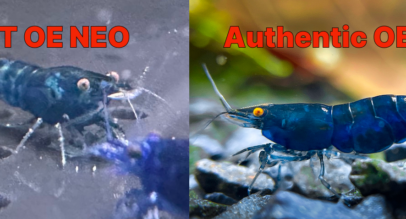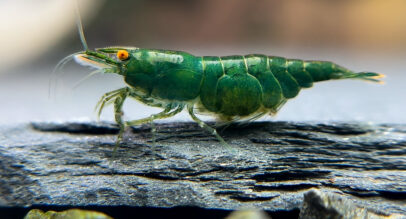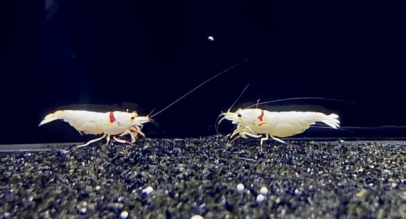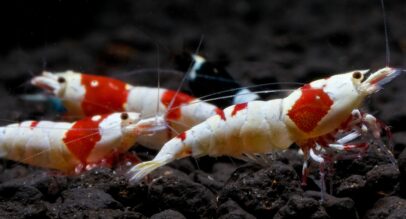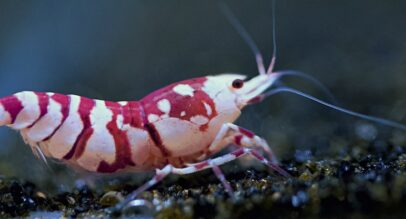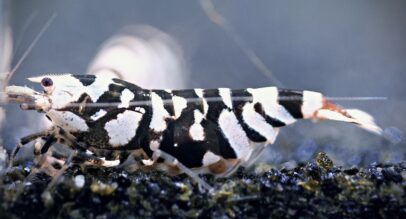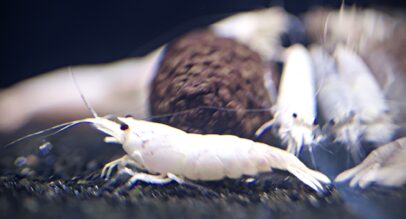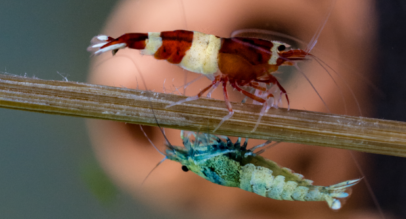The proper nutrition and feeding management of Caridina Black Super Crystal shrimp stands as a critical determinant of success in both hobby and commercial shrimp keeping. These premium-grade invertebrates require precise nutritional care to achieve their optimal development, coloration, and breeding potential.
Maintaining appropriate feeding protocols directly influences the reproductive success of Black Super Crystal shrimp colonies. Proper nutrition ensures consistent molting cycles, supports egg development in females, and promotes viable offspring production. When breeding pairs receive optimal nutrition, they demonstrate enhanced fertility rates and produce stronger juveniles, ultimately leading to more sustainable colony growth.
The development and maintenance of the characteristic deep black coloration in these shrimp is intrinsically linked to their dietary intake. High-quality nutrition, rich in essential carotenoids and minerals, plays a fundamental role in pigment expression and maintenance. Suboptimal feeding regimens often result in color deterioration, reducing both the aesthetic value and market worth of these premium specimens.
Furthermore, the relationship between nutrition and longevity in Black Super Crystal shrimp cannot be overstated. While these Caridina species typically exhibit a lifespan of 18-24 months, proper feeding management can maximize their vitality throughout this period. Optimal nutrition supports immune function, reduces stress during molting cycles, and maintains metabolic efficiency, all of which contribute to extended lifespans and sustained breeding capability.
This comprehensive understanding of nutritional requirements forms the foundation for successful Black Super Crystal shrimp cultivation, whether in professional breeding operations or advanced hobbyist settings. The following sections will detail specific dietary requirements and feeding protocols essential for maintaining these prestigious invertebrates at their peak condition.
Core Feeding Philosophy
The cornerstone of successfully maintaining Caridina Black Super Crystal shrimp lies in adhering to a straightforward and methodical feeding approach. While these premium invertebrates command significant investment, their nutritional requirements benefit most from a philosophy that prioritizes simplicity over complexity.
The fundamental relationship between feeding practices and water stability emerges as a critical consideration in shrimp husbandry. Each feeding instance introduces organic matter into the aquatic environment, directly impacting water chemistry. Excessive feeding, regardless of food quality, can destabilize carefully maintained water parameters. This destabilization poses particular risks for Caridina species, which exhibit lower tolerance for parameter fluctuations compared to their Neocaridina counterparts. Therefore, the implementation of measured, controlled feeding protocols serves to maintain both nutritional sufficiency and environmental stability.
Adopting an ecosystem-based approach to nutrition represents the most sustainable methodology for long-term success. This perspective acknowledges that the aquarium functions as an interconnected system where feeding practices influence not only the shrimp directly but also the biological filtration capacity, microbial communities, and botanical elements within the environment. By cultivating and maintaining beneficial biofilm and microorganisms through appropriate feeding strategies, caretakers establish a more resilient and self-sustaining ecosystem that supplements prepared feeds with natural grazing opportunities.
This holistic approach to nutrition emphasizes the balance between providing adequate nutrition while minimizing system disruption. Rather than focusing solely on maximizing growth or color intensity through aggressive feeding regimens, successful shrimp keeping prioritizes the establishment of a stable, balanced environment where feeding practices support rather than challenge system equilibrium. This philosophy proves particularly relevant for Black Super Crystal shrimp, whose superior genetics and premium status demand optimal environmental conditions for sustained success.
Through this measured approach to feeding, caretakers can better ensure the long-term health and vitality of their colonies while maintaining the pristine water conditions essential for these prestigious invertebrates.
Essential Diet Components
The foundation of successfully maintaining Caridina Black Super Crystal shrimp rests upon providing appropriate staple nutrition that meets specific quality benchmarks. Understanding these core dietary requirements ensures optimal health, coloration, and breeding success.
Staple Food Requirements
The draw factor of food items represents a critical consideration in shrimp nutrition. Premium-grade shrimp food must exhibit sufficient attractiveness to encourage immediate feeding behavior. This characteristic helps ensure that food items are consumed promptly rather than decomposing in the aquarium environment. Quality staple foods typically incorporate natural attractants such as spirulina, marine-derived proteins, or botanical extracts that stimulate feeding responses.
Food stability in water emerges as a paramount concern, governed by the essential 2-3 hour rule. Staple foods must maintain their structural integrity for this duration while gradually softening to facilitate consumption. Foods that dissolve too quickly contribute to water quality degradation, while those that remain overly firm may be difficult for shrimp to process effectively. The Rare Shrimp Complete formula demonstrates exceptional water stability, maintaining its structure while becoming appropriately palatable within this crucial timeframe.
Digestibility factors significantly influence the nutritional value derived from staple foods. High-quality ingredients processed at appropriate temperatures ensure maximum nutrient bioavailability. The digestive system of Caridina shrimp operates most efficiently when presented with foods featuring finely milled ingredients and balanced protein-to-fiber ratios. This optimization of digestibility reduces waste production and supports efficient nutrient absorption.
Nutritional balance requirements for Black Super Crystal shrimp demand precise formulation. The ideal staple diet incorporates protein levels between 28-35%, supplemented with essential fatty acids, vitamins, and minerals. Particularly crucial are compounds that support exoskeleton development and pigmentation maintenance. The Rare Shrimp Complete food line has been specifically formulated to meet these exacting requirements, incorporating premium ingredients that support both growth and color enhancement.
Proper portioning and feeding methods play an integral role in dietary success. The recommended approach involves providing small amounts that can be consumed within the 2-3 hour window. This typically translates to feeding amounts that shrimp can clear within this timeframe, adjusted based on colony size and activity levels. For optimal results, distribute food in designated feeding areas to facilitate monitoring of consumption rates and minimize waste.
The Rare Shrimp Complete food series represents a scientifically formulated approach to meeting these dietary requirements. Its composition specifically addresses the unique nutritional demands of premium-grade crystal shrimp, while its physical properties align with optimal feeding protocols. This specialized formulation provides a comprehensive nutritional foundation that supports both the biological needs and aesthetic qualities of Black Super Crystal shrimp.
Biofilm Development
The natural grazing behavior of Caridina Black Super Crystal shrimp represents a fundamental aspect of their nutritional requirements. These sophisticated invertebrates instinctively spend significant portions of their time foraging for microorganisms and biofilm that develop on aquarium surfaces. Understanding and supporting this behavior proves essential for maintaining optimal colony health.
The importance of biofilm for colony health extends beyond basic nutrition. These microscopic communities provide a continuous source of natural nutrition that supplements prepared foods. More importantly, they deliver beneficial bacteria and microorganisms that support digestive health and immune function within the shrimp colony. The presence of robust biofilm communities often correlates with increased breeding success and juvenile survival rates.
Supporting healthy microorganism growth requires a systematic approach to aquarium maintenance and feeding protocols. The establishment of beneficial bacterial colonies depends on stable water parameters and the presence of appropriate organic compounds. These microorganisms form the foundation of the aquarium’s ecological network, contributing to both water quality and shrimp nutrition.
Methods for promoting biofilm development encompass several key strategies. Proper lighting conditions, stable water parameters, and the introduction of appropriate surfaces for colonization all play crucial roles. The strategic placement of botanical elements, such as Indian Almond leaves or Rare Shrimp Biofilm Culture Bags, provides ideal substrates for biofilm establishment while simultaneously releasing beneficial compounds into the water column.
The Rare Shrimp Biofilm Culture Bags represent an innovative approach to biofilm cultivation. These specialized substrates are designed to accelerate the development of beneficial microorganism communities while providing optimal grazing surfaces for shrimp. The bags’ composition supports sustained biofilm growth while maintaining water quality stability, creating an ideal supplement to prepared feeding regimens.
Incorporating these bags into the aquarium environment offers several advantages. Their controlled decomposition rate ensures steady nutrient release for microorganism growth without compromising water quality. The textured surface area provides excellent colonization opportunities for beneficial bacteria while creating natural grazing zones that support the shrimp’s instinctive feeding behaviors.
Managing biofilm development through these methods establishes a more resilient and self-sustaining ecosystem. This natural supplementation of the shrimp’s diet contributes to improved colony health, enhanced color development, and more successful breeding outcomes. The combination of quality prepared foods and robust biofilm development creates the optimal nutritional environment for maintaining premium-grade Black Super Crystal shrimp.
Professional Feeding Schedule
The implementation of a structured feeding regimen represents a critical component in the successful maintenance of Caridina Black Super Crystal shrimp colonies. A methodical approach to nutrition delivery optimizes both shrimp health and water quality management.
Daily Routine Management
The professional feeding protocol centers on an alternating schedule that maximizes nutritional benefits while maintaining system stability. This approach divides feeding instances between complete nutrition days and microbial supplement days, creating a balanced routine that supports both direct nutrition and ecosystem health.
Complete Nutrition Days
On designated feeding days, the administration of Rare Shrimp Complete food provides comprehensive nutrition through its specialized formulation. This premium feed should be offered in measured portions that the colony can consume within the critical 2-3 hour window. The precise portioning depends on colony size, typically administered during the morning hours to allow for proper monitoring of consumption patterns.
Microbial Supplement Days
Alternating days focus on the application of the Rare Shrimp Microbial supplement, which supports the development and maintenance of beneficial microorganism populations within the aquarium ecosystem. This supplement enhances the natural biofilm development while contributing to stable water chemistry. The microbial supplement should be administered according to the recommended dosage, considering the system volume and colony size.
Implementation Strategy
The execution of this feeding schedule requires attention to several key factors. First, maintain consistent timing for both food and supplement administration, preferably during morning hours when monitoring is feasible. Second, observe the colony’s response to ensure appropriate portion sizes and adjust accordingly. Third, monitor water parameters regularly to verify the schedule maintains optimal water quality.
This professional feeding protocol creates a sustainable pattern that supports both direct nutrition through quality prepared foods and ecosystem enhancement through microbial supplementation. The alternating schedule prevents overfeeding while ensuring consistent nutrition delivery, contributing to optimal colony health, color development, and breeding success in Black Super Crystal shrimp populations.
Through careful adherence to this feeding schedule, caretakers can establish a reliable routine that promotes both individual specimen health and overall system stability, key factors in maintaining premium-grade crystal shrimp colonies.
Observation Periods
The systematic monitoring and supplementation protocol for Caridina Black Super Crystal shrimp requires careful attention to timing and observation. This structured approach ensures optimal nutrition delivery while maintaining stable water parameters.
Weekly Protocol Implementation
The weekly feeding and supplementation schedule follows a precise pattern designed to support comprehensive nutrition and immune health. This protocol integrates regular feeding, microbial supplementation, and vitamin administration to create a balanced nutritional environment.
Day 1: Regular Feeding Begin the week with a measured portion of Rare Shrimp Complete food, administered during morning hours. Monitor consumption patterns and adjust portions based on colony response. This establishes the baseline for weekly nutrition delivery.
Day 3: Microbial Supplementation Apply the Rare Shrimp Microbial supplement according to system volume specifications. This supplementation supports beneficial bacterial populations and enhances the aquarium’s biological stability. Observe the colony’s foraging behavior following supplementation.
Day 5: Regular Feeding Return to complete nutrition with Rare Shrimp Complete food. This feeding instance maintains nutritional consistency while allowing sufficient time between feedings for proper digestion and water quality maintenance.
Day 7: Comprehensive Supplementation The week concludes with a dual supplementation approach. Administer both the microbial supplement and Rare Shrimp Vitamins. This combination supports immune function and overall colony health. The vitamin supplement provides essential micronutrients that enhance disease resistance and promote optimal metabolic function.
Biofilm Management
Throughout this weekly cycle, maintain consistent monitoring of biofilm development through the Rare Shrimp Biofilm Culture Bags. These substrates should be inspected during each feeding or supplementation instance to ensure proper colonization and utilization by the colony. Replace or supplement bags according to manufacturer recommendations to maintain consistent biofilm availability.
Observation Guidelines
During each feeding or supplementation instance, allocate time for systematic observation. Monitor key behavioral indicators including:
- Initial response to food or supplement introduction
- Distribution of colony members during feeding periods
- Activity levels following supplementation
- Signs of molting activity
- Color intensity and uniformity
This structured observation protocol enables early detection of potential issues and allows for timely adjustments to the feeding regimen. Through consistent implementation of this weekly schedule, caretakers establish a stable nutritional environment that supports the premium quality and health of their Black Super Crystal shrimp colony.
Common Pitfalls
Understanding and avoiding common mistakes in Caridina Black Super Crystal shrimp nutrition management proves essential for long-term success. Several critical areas require particular attention to prevent adverse outcomes in colony health and development.
Overfeeding represents one of the most significant risks in shrimp husbandry. The introduction of excess nutrients through overfeeding can rapidly destabilize water chemistry, leading to potentially harmful parameter fluctuations. Even premium-quality foods must be administered in appropriate quantities to maintain system stability. Excess food decomposition places unnecessary strain on biological filtration systems and can trigger cascading water quality issues.
Supplement misuse presents another notable concern. While nutritional supplements offer valuable benefits, their improper application can lead to complications. It is crucial to understand that supplements cannot compensate for fundamental system instability or poor water quality. Particularly in the case of vitamin supplementation, these products should be reserved for established, healthy colonies rather than viewed as remedial solutions for struggling systems.
Parameter fluctuations often correlate with feeding practices. Sudden changes in feeding routines or quantities can trigger shifts in water chemistry that stress sensitive Caridina species. Maintaining consistent feeding schedules and amounts helps preserve stable water parameters, which proves essential for long-term colony success.
Colony stress signals require careful monitoring and appropriate response. Signs of stress may include reduced feeding activity, color deterioration, or unusual behavior patterns. When these indicators appear, resist the impulse to increase feeding or supplementation, as this often exacerbates underlying issues. Instead, focus on stabilizing water parameters and returning to basic feeding protocols.
The successful maintenance of Caridina Black Super Crystal shrimp colonies fundamentally depends on system stability. This stability encompasses not only water parameters but also feeding routines, supplementation schedules, and environmental conditions. Consistency in these areas provides the foundation for long-term success.
Regular observation plays a crucial role in maintaining colony health. Through careful monitoring of feeding responses, molting patterns, and general behavior, caretakers can identify potential issues before they become significant problems. This observational approach enables proactive adjustments to feeding and supplementation protocols when necessary.
Long-term success indicators extend beyond immediate colony health. Sustainable breeding patterns, consistent color development, and stable water parameters all signal effective nutritional management. These outcomes result from the careful balance of proper feeding, appropriate supplementation, and maintaining system stability.
The ultimate goal in Caridina Black Super Crystal shrimp husbandry involves creating and maintaining a stable environment where premium specimens can thrive. Through careful attention to feeding protocols, judicious use of supplements, and regular monitoring, caretakers can establish conditions that support both individual specimen health and colony sustainability.

